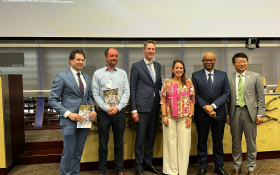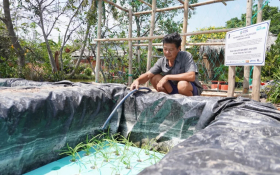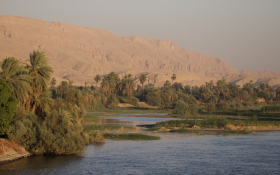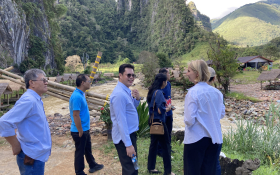Dutch government signs agreement with Bangladesh and World Bank on financing adaptive delta management
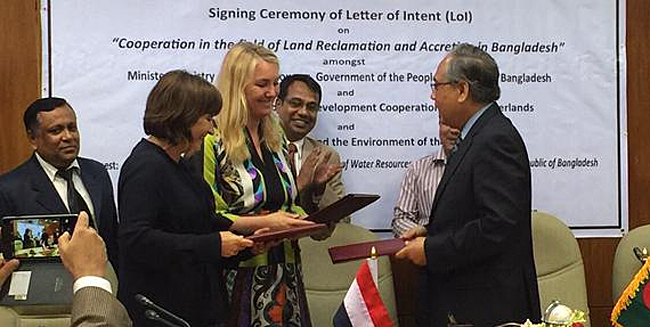
Dutch ministers Lilianne Ploumen (Foreign Trade and Development Cooperation) and Melanie Schultz van Haegen (Infrastructure and the Environment) signed an agreement with the Bangladesh government and the World Bank Group, on the development of a financial strategy for investements in a more sustainable protection of Bangladesh's river delta.
The strategy enables the World Bank to make a selection and prioritization in their project portfolio, contributing to the implementation of the Bangladesh Delta Plan 2100 as being developed with support from the Dutch government.
On the occassion the Netherlands and Bangladesh also agreed on joining forces in the field of land reclamation and port development.
The signing ceremony of the letter of intent with minister for Water resources Barrister Anisul Islam Mahmud of Bangladesh (right on top photo), took place in Dhaka on 16 June.
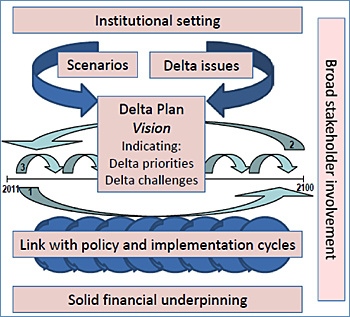 Begin with the end in mind, that is basically the Dutch delta approach. First develop a long term vision and move step by step towards the realisation.
Begin with the end in mind, that is basically the Dutch delta approach. First develop a long term vision and move step by step towards the realisation.
Dutch delta thinking
With nearly 400 rivers and the largest delta in the world, Bangladesh is hit by major floods every year, affecting two-third of the country. With the help of the Dutch government a strategy - a Delta plan - has been drawn up that provides Bangladesh with a comprehensive long-term vision on a safe and sustainable development of its river delta.
The World Bank wants to anchor its current and future investments in the water sector into this Delta plan and apply the principles of adaptive delta management, that is known as the Dutch delta approach.
Flexibility and robust decision making
The World Bank recognizes the importance of creating long-term scenarios for the Bangladesh delta, which allow a more holistic adaptive approach to delta management.
This adaptive approach combines adaption and flexibility to empower robust decisions based on a better understanding of future scenarios.
By making the approach flexible, the solutions are more likely to be resilient and limit over- or under- investment. This is particularly important if the impact of climate change is to be fully integrated into managing the delta.
Benefit to both countries
Minister Schultz: "At first sight, the water challenges in the Netherlands and Bangladesh are similar: low-lying, densely populated delta countries, with major rivers flowing out into the sea, comprehensive migration into the cities, a strategic position vis-à-vis the hinterland. The scale and the complexity of the issues are, however, not comparable. Nonetheless, more intensive collaboration will benefit both countries."
Its location, its immense poverty and population density make Bangladesh extremely vulnerable to the consequences of climate change, stated Johannes Zutt, World Bank country manager for Bangladesh. "The Delta Plan 2100 takes up the challenge of constructing a resilient, sustainable delta that will be of benefit to millions of people. Their lives and livelihoods depend on these unique surroundings."
Abul Maal Abdul Muhith, the Bengal Finance Minister, endorses this: "A long-term vision, looking 50 to 100 years ahead, is important for the future of Bangladesh. The integrated approach should help protect, restore and improve our delta’s ecosystem, while bolstering socio-economic development."
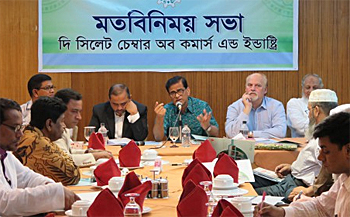 A Bangladesh Delta Plan 2100 mission team has already embarked on stakeholder meetings such as here seen in the city of Sylhet in May 2015.
A Bangladesh Delta Plan 2100 mission team has already embarked on stakeholder meetings such as here seen in the city of Sylhet in May 2015.
Commitment of many actors
Over the past decades, the Bangladesh government has invested more than 10 billion dollars to make the country less vulnerable to natural disasters. River dykes have been strengthened, emergency shelters have been constructed where people can shelter during cyclones, and warning systems have been set up. These efforts have significantly reduced the number of casualties, damage to the living environment and the material damage resulting from extreme weather conditions.
"Collaboration is extremely important, because the immense water challenges call for the resources and commitment of many actors. This plan unites the government, international financial institutions, NGOs and the private sector in Bangladesh for the welfare of those who inhabit the delta”, said Anders Berntell, Executive director of the 2030 Water Resources Group of the World Bank.
Analysis of future investments
The investment strategy will be supported by a investment strategy tool developed by consultancy firm Grontmij and financial advisor Rebel. This tool will feature an analysis to:
● check if climate resilience is taken into account
● spot opportunities for synergy with investments in other sectors
● identify opportunities with other stakeholders for future investments and public-private partnerships.
50 years of water cooperation
On the occasion of the visit, the Dutch water sector made a special Bangladesh-the Netherlands magazine and video, celebrating the 50 years of water cooperation between the two delta countries.
This news item is based on press releases on the websites of Grontmij and Rebel Group (in Dutch only), the Dutch government and World Bank.
Read also on this website
● Bangladesh government takes up 100-year delta plan to reduce climate risks, 28 August 2014
● Dutch government assists Bangladesh with set up long term flood protection programme, 23 May 2012
● Countries: Bangladesh
● Projects: Bangladesh Delta Plan 2100
More information
Grontmij
De Bilt, the Netherlands
+31 30 220 79 11
www.grontmij.com
Rebel Group
Rotterdam, the Netherlands
+31 10 275 5995
www.rebelgroup.com
BanDuDeltAS Office
Dhaka, Bangladesh
+88 01671758878
www.bandudeltas.org
